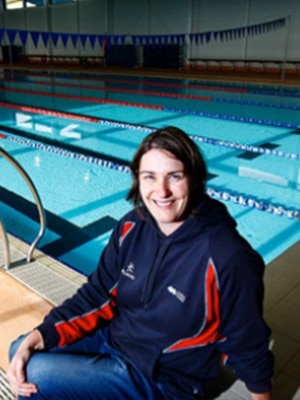Our Olympians
Alison Fitch

What sports did you play when you were growing up?
I played off and on social netball, social tennis on Saturdays and did gymnastics straight before school before swimming on Wednesday nights. When I qualified for the Olympics in 1996 at 16 I gave up all other sports because I was not known for my co-ordination and there was a real risk I would injure myself with my lack of real sporting ability, so decided best to just follow through on the one sport I seemed to be better at.
How old were you when you first started seriously training for swimming?
I started serious training (or at least started to keep my log books and track my training progress etc) when I hit high school at 13.
Over my entire swimming career I missed three scheduled training sessions so was always a committed swimmer even when I first started as I was always held accountable for all the sports I signed up for by mum and dad.
“Once I committed to the season I was expected to meet all the attendance requirements asked for by the coaches and that was my responsibility to meet”
I had to set my own alarms in the morning and dad would only get up to take me training once I was awake as that was my responsibility so I learnt pretty early to understand all the responsibilities of the commitment I had taken on no matter what the sport.
Why did you choose swimming?
I showed slightly more ability in this than my other sports.
I enjoyed the self-measurement side of the sport and liked that most of the time your hard work was reflected in your improvements which made it easier to want to keep going and training hard.
When you were an age group swimmer was competing at national events a real goal for you and did you have any medals? If you did can you tell us what for and how old were you?
Yes NAGS was a pinnacle of the season for me and I expected to swim well at it and then when I made opens and started being in contention for national teams focus moved from NAGs to open nationals.
But, I used NAGS as a racing meet expecting to PB and then move to opens and improve again (not always how it ended up but I loved my NAGS experiences).
I raced all events at NAGS on the programme (15 events) and was allowed to miss one race and that was always 200m backstroke.
I absolutely despised it as I found it the hardest race on my legs.
I was not known for my kicking capability and had to work extra hard on it to make small gains.
I won my first national medal at 12 in the 100m freestyle and then went on to have a pretty good medal haul at national age and open level throughout my swimming career.
When things are getting tough and training isn’t going so well what motivated you to stay in the sport?
I was always encouraged to swim all events and race across all the programme as often as possible.
This meant that when things weren’t going well in one stroke I could PB in others.
I did this all the way through my swimming career at all local meets I swam multiple mixed events and it was only at national opens (selection meets) where I would focus on the races I was trying to qualify for.
This kept me going through most things. I spent four years without a PB in my main events and this was incredibly frustrating and at times very upsetting.
I kept a list of all the reasons I wanted to swim and all the reasons I didn’t.
Often the reasons for not swimming far outnumbered the positives but when I looked through them I could see how silly some of the reasons for wanting to finish swimming were – often you just need to write them down to see them differently I found.
Any advice for up and coming young swimmers?
You don’t always need to LIKE swimming, but you should always LOVE it and have a passion for improving.
It can sometimes be a chore and tough and of course I didn’t always want to go training, but I still went because I could see the outcome that I wanted to get to and reminded myself of that every day.
I kept a log book and made sure each session I had a skill that I wanted to work on – this definitely made it easier to focus.
